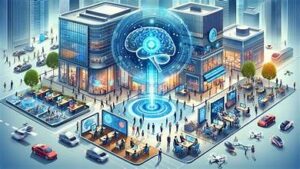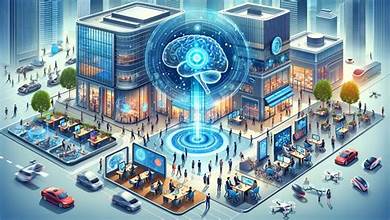
In the rapidly evolving landscape of business, artificial intelligence (AI) stands out as a game-changer. As we approach 2024, leveraging AI is no longer a luxury but a necessity for companies aiming to stay ahead of the curve. This article explores how AI is poised to reshape business strategies, enhance operational efficiency, and drive innovation. We’ll delve into the top future business trends driven by AI, highlighting how businesses can harness these advancements for competitive advantage.
1. AI-Driven Personalization
Personalized Customer Experiences: AI technologies are revolutionizing how businesses interact with customers by providing highly personalized experiences. Machine learning algorithms analyze vast amounts of data to understand customer preferences, behavior, and purchasing patterns. This allows companies to tailor their products, services, and marketing strategies to individual needs.
Example: Retailers like Amazon use AI to recommend products based on past purchases and browsing history, significantly increasing conversion rates. In 2024, businesses will further refine these personalization techniques, using advanced AI to predict future trends and customer needs more accurately.
2. Enhanced Data Analytics
Predictive Analytics: AI-powered analytics tools enable businesses to make data-driven decisions with greater accuracy. Predictive analytics uses historical data and machine learning algorithms to forecast future trends, identify potential risks, and uncover new opportunities.
Example: Financial institutions leverage AI to predict market trends and optimize investment strategies. In 2024, the integration of AI in data analytics will become more sophisticated, allowing for real-time insights and more proactive decision-making.
Automated Data Processing: AI also facilitates automated data processing, reducing the time and effort required to analyze large datasets. This efficiency helps businesses streamline operations and focus on strategic initiatives rather than mundane tasks.
3. AI-Powered Automation
Streamlining Operations: Automation powered by AI is transforming various business processes, from manufacturing to customer service. AI-driven automation reduces manual intervention, minimizes errors, and increases efficiency.
Example: Robotic process automation (RPA) tools automate repetitive tasks such as data entry and invoice processing. In 2024, businesses will increasingly adopt AI-driven automation to optimize supply chain management, enhance customer support, and accelerate product development.
Smart Manufacturing: AI is revolutionizing manufacturing with smart factories and Industry 4.0 technologies. AI-driven systems monitor equipment performance, predict maintenance needs, and optimize production schedules, leading to reduced downtime and cost savings.
4. AI in Customer Service
Chatbots and Virtual Assistants: AI-powered chatbots and virtual assistants are becoming integral to customer service operations. These tools handle routine inquiries, provide instant support, and offer personalized recommendations, enhancing customer satisfaction.
Example: Companies like Sephora and H&M use AI chatbots to assist customers with product recommendations and order tracking. In 2024, advancements in natural language processing (NLP) will make these tools even more effective in understanding and responding to complex customer queries.
Sentiment Analysis: AI tools can analyze customer feedback and social media interactions to gauge sentiment and identify areas for improvement. This insight helps businesses address customer concerns proactively and improve overall service quality.
5. AI-Driven Innovation
Product Development: AI accelerates product development by simulating and optimizing designs, testing prototypes, and predicting market success. Companies can leverage AI to bring innovative products to market faster and with greater precision.
Example: Tech companies like Apple and Google use AI to design and test new technologies, from wearables to smart home devices. In 2024, AI will play a crucial role in developing cutting-edge products that cater to emerging consumer needs and preferences.
Creative AI: AI is also making waves in creative fields, including design, music, and content creation. AI algorithms generate art, compose music, and write content, pushing the boundaries of creativity and offering new opportunities for artistic expression.
6. AI and Cybersecurity
Threat Detection and Prevention: AI enhances cybersecurity by detecting and responding to threats in real-time. AI algorithms analyze patterns and anomalies in network traffic to identify potential security breaches and prevent attacks.
Example: Companies like Darktrace and CrowdStrike use AI to provide advanced threat detection and response solutions. In 2024, AI-driven cybersecurity will become increasingly sophisticated, offering proactive defense mechanisms against evolving cyber threats.
Fraud Detection: AI also plays a vital role in detecting and preventing fraud in financial transactions. Machine learning models analyze transaction patterns to identify suspicious activity and prevent financial losses.
7. Ethical AI and Governance
Responsible AI Development: As AI becomes more integral to business operations, ethical considerations and governance will be paramount. Companies must ensure that AI systems are developed and used responsibly, addressing issues such as bias, privacy, and transparency.
Example: Organizations like the Partnership on AI advocate for responsible AI practices and guidelines. In 2024, businesses will prioritize ethical AI development, implementing frameworks and policies to ensure fair and transparent AI usage.
AI Governance: Effective AI governance involves establishing policies and procedures for AI deployment, monitoring performance, and addressing potential risks. Companies will invest in governance structures to manage AI systems effectively and mitigate associated challenges.
8. AI in Human Resources
Talent Acquisition and Management: AI is transforming human resources by streamlining talent acquisition, onboarding, and performance management. AI-driven tools analyze resumes, assess candidate fit, and predict employee success.
Example: Recruitment platforms like HireVue and Pymetrics use AI to evaluate candidates based on skills, experience, and cultural fit. In 2024, AI will further enhance HR practices, improving recruitment processes and employee engagement.
Employee Development: AI can also support employee development through personalized learning and career growth opportunities. AI-driven platforms offer tailored training programs and career recommendations, helping employees advance their skills and reach their potential.
Conclusion
As we move into 2024, AI will continue to drive transformative changes across various business sectors. From enhancing personalization and data analytics to automating operations and innovating product development, AI offers significant opportunities for companies to gain a competitive edge. Embracing these AI-driven trends will be crucial for businesses aiming to thrive in the dynamic landscape of the future. By harnessing AI effectively, companies can unlock new potentials, streamline processes, and create value in ways that were previously unimaginable.


